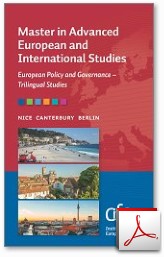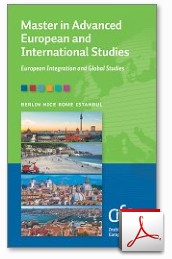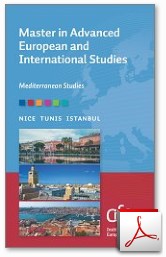
Postgraduate Programme in EU Studies and International Relations
|
|
MAEIS - Trilingual studies - European Policy and Governance  3 languages: French, English, German 3 languages: French, English, German  3 places: Nice, Canterbury, Berlin 3 places: Nice, Canterbury, Berlin
 This programme is held in Nice, Canterbury and Berlin (3 terms from October to June + optional professional internship (3-6 months)). This programme is held in Nice, Canterbury and Berlin (3 terms from October to June + optional professional internship (3-6 months)).
The programme is organised in cooperation with the University of Kent.
A study trip to European and international organisations is also included in the studies. This multi-faceted approach offers the students various different perspectives on contemporary Europe. Through this unique approach, the trilingual branch gives the students an insight into some fundamental elements of European integration, including French-German relations.
Courses are taught in three languages: French, English and German.
The curriculum includes the following modules:
 The EU in a multipolar world The EU in a multipolar world
 Policy-Making in the EU Policy-Making in the EU
 Democracy, Federalism and Governance Democracy, Federalism and Governance
 Economic and Monetary Integration Economic and Monetary Integration
 Professional Skills Workshops Professional Skills Workshops

| MAEIS - TRILINGUAL STUDIES - more... |
MAEIS - European integration and global studies  1 language: English 1 language: English  3 places: Berlin, Nice, Rome/Istanbul 3 places: Berlin, Nice, Rome/Istanbul
 The academic year starts in Berlin (from October to December), it encompasses classes on the basics of all the four modules (International Relations, European Integration, Economy and Globalisation and Federalism and Governance), completed by the seminar « Project cycle management », the core part of the fifth module "Professional Skills Workshops". The academic year starts in Berlin (from October to December), it encompasses classes on the basics of all the four modules (International Relations, European Integration, Economy and Globalisation and Federalism and Governance), completed by the seminar « Project cycle management », the core part of the fifth module "Professional Skills Workshops".
In Nice the programme focuses on the experiences of Eastern and Central European countries following their accession to the European Union as well as those fundamental problems with which Turkey and other future candidate countries are faced. During this period the participants take their midterm exams. A one week study trip takes them to the European institutions and international organisations in Brussels, Strasbourg and Luxembourg. The third term deals with the relations of the European Union with candidate countries, as well as with Caucasus countries, Central Asia, and the Middle East. According to their choice, students will do their third trimester either in Rome or in Istanbul.
The curriculum includes the following modules:
 Conflict and cooperation in the international system Conflict and cooperation in the international system
 European integration and external action European integration and external action
 Federalism and multi-level governance Federalism and multi-level governance
 Globalisation and sustainable development Globalisation and sustainable development
 Professional Skills Workshops Professional Skills Workshops

| MAEIS EUROPEAN INTEGRATION AND GLOBAL STUDIES - More... |
MAEIS - Mediterranean studies  2 languages: French, English 2 languages: French, English  3 places: Nice, Tunis, Istanbul 3 places: Nice, Tunis, Istanbul
 The programme of Mediterranean studies is structured into three terms: The programme of Mediterranean studies is structured into three terms:
The first term (October to January) starts in the European Union, in Nice, France. It encompasses classes on the basics of the five modules (Conflict Management and Peace Making, Sustainable Development and Climate Action, Regional Integration and Transformation, Mediterranean Politics and Societies as well as Professional Skills Workshops).
The second term (January to April) starts off in Tunis, Tunisia. A special focus will be with migration and youth policies in the Mediterranean. A study trip to Istanbul will take place druing the 2nd or the 3rd term.
The programme concludes in Istanbul, Turkey (April to June). Students will have the opportunity to advance in their research work, as the last four weeks of the programme will be left at their disposal to work on their thesis. The programme concludes with the defence of the thesis and oral exams.
The curriculum includes the following modules:
 Conflict Management and Peace Making Conflict Management and Peace Making
 Sustainable Development and Globalisation Sustainable Development and Globalisation
 Regional Integration and Transformation Regional Integration and Transformation
 Mediterranean Politics and Societies Mediterranean Politics and Societies
 Professional Skills Workshops Professional Skills Workshops

| MAEIS MEDITERRANEAN STUDIES - More... |
|
|
 The MAEIS is quintessentially an international programme. The student body constitutes a small international community: Each year, between 15 and 20 different nationalities are represented among the students. Lectures are delivered by speakers coming from a variety of countries. During the academic year, the participants study in three different countries and visit other countries in the form of study trips. The MAEIS is quintessentially an international programme. The student body constitutes a small international community: Each year, between 15 and 20 different nationalities are represented among the students. Lectures are delivered by speakers coming from a variety of countries. During the academic year, the participants study in three different countries and visit other countries in the form of study trips.
 The MAEIS is an interdisciplinary programme. We receive students who have studied Economics, Political Science, History, Languages, but also graduates from other subjects as diverse as Natural Sciences, Engineering or the Arts. This diversity of academic background of our students makes the in-class discussions and group work during the year particularly interesting and engaging. The MAEIS is an interdisciplinary programme. We receive students who have studied Economics, Political Science, History, Languages, but also graduates from other subjects as diverse as Natural Sciences, Engineering or the Arts. This diversity of academic background of our students makes the in-class discussions and group work during the year particularly interesting and engaging.
The teachers also come from various differing disciplines and include political scientists, lawyers, economists, historians, and sociologists.
 The MAEIS prepares the students for professional life. The CIFE is in close contact with international organisations, European institutions and other actors of the European political environment. High-ranking civil servants, diplomats, and experts contribute to our teaching and acquaint the students with their daily work patterns in these organisations. We put students in contact with organisations which may be able to offer the man internship after the end of the academic year. Simulations which replicate negotiations in international institutions help prepare the students in a concrete way for their future work. The MAEIS prepares the students for professional life. The CIFE is in close contact with international organisations, European institutions and other actors of the European political environment. High-ranking civil servants, diplomats, and experts contribute to our teaching and acquaint the students with their daily work patterns in these organisations. We put students in contact with organisations which may be able to offer the man internship after the end of the academic year. Simulations which replicate negotiations in international institutions help prepare the students in a concrete way for their future work.
 The MAEIS allows close and regular contact between students and teaching staff. Each year consists of amaximum of approximately 30 students. The same teaching staff accompanies them to the different locations where the programme takes place. Hence, there is continual evaluation of the students’ work which guarantees the programme’s coherence. The MAEIS allows close and regular contact between students and teaching staff. Each year consists of amaximum of approximately 30 students. The same teaching staff accompanies them to the different locations where the programme takes place. Hence, there is continual evaluation of the students’ work which guarantees the programme’s coherence.
 The MAEIS puts a lot of emphasis on the students’ individual research. The thesis which each student has to prepare during the academic year offers the possibility to gain expertise in a specific field and helps to prepare for the real world of work. We put our students in contact with experts who can be of assistance in their research. The MAEIS puts a lot of emphasis on the students’ individual research. The thesis which each student has to prepare during the academic year offers the possibility to gain expertise in a specific field and helps to prepare for the real world of work. We put our students in contact with experts who can be of assistance in their research.
Our study visits provide the students with the opportunity to access specialised libraries and to discuss findings with competent personalities.
Students who successfully complete the programme acquire ECTS credits
For more information please contact:
INSTITUT EUROPEEN · EUROPEAN INSTITUTE
dheei@cife.eu
|